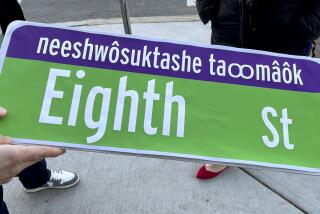Hey, Cheeseheads: Say ‘Chequamegon’
- Share via
MADISON, WIS. — Even for native Cheeseheads, speaking like a local can be a linguistic nightmare.
Just ask radio reporter Jackie Johnson, who grew up in Wisconsin. On the air, she has butchered the proper inflection for “Chequamegon” National Forest, and struggled to sound out town names like “Oconomowoc.” Her friends have garbled the pronunciation of “Lake Butte des Morts,” and gotten tongue-tied over some of the state’s Native American tribes.
Even her sources have trouble: Voters here in the state capital have struggled so much with saying the mayor’s name -- Dave Cieslewicz -- that his 2003 campaign lawn signs spelled it out phonetically.
“People even say the state name wrong: They call it ‘Wes-consin’ all the time and it annoys me each time I hear it,” said Johnson, who reports on politics for the statewide Wisconsin Radio Network. “I figured that I can’t be the only one who has this problem and is secretly embarrassed.”
So, in her off-hours, the broadcaster created MissPronouncer.com, a website that provides free audio files of the correct pronunciations of more than 190 Wisconsin cities, 400 villages and nearly 1,300 towns.
MissPronouncer also gives an oral guide through a quagmire of high-profile names, including scores of judges, state officials and sports celebrities.
While researching for the site, she learned that many names were bestowed by Scandinavian, Polish, German and Irish immigrants, who were drawn to the region’s farming, mining and lumber industries. Other names were rooted in the rich Native American heritage of the region -- it is home to 11 of the 12 tribes of the Great Lakes Inter-Tribal Council.
The result is family names drawn from the languages of immigrants and local pronunciations of towns thickened by regional accents.
“The more people I talk to throughout the state, the more I realized everyone takes ownership and pride in their town names,” Johnson said. “They really care about it, its history and its pronunciation.”
The site, launched in January with little fanfare, has built such a strong grass-roots following among language lovers that Gov. James E. Doyle awarded Johnson a special commendation last week for her effort to promote proper pronunciation.
Praising Johnson for protecting her home state “from verbal annihilation,” Doyle suggested that “it behooves visitors and Wisconsinites alike to take advantage of MissPronouncer .com’s expertise and acquaint -- or reacquaint -- themselves with the language before venturing into the verbal minefields of the great state of Wisconsin.”
Among the site’s fans is Doyle’s wife.
“I first discovered it when I was panicked [last year]. I was on my way to northern Wisconsin and I couldn’t pronounce ‘Chequamegon,’ ” Jessica Doyle said.
A friend suggested she peruse the site for a hint. She quickly found what she was looking for: “shuh-WAH-mah-gen.”
Now, any time Wisconsin’s first lady travels around the state, she said she pops into the site first before hitting the road.
Johnson began researching town names in 2005, scouring atlases and state maps for the mundane and the unusual. Over the months, Johnson called librarians, regional historians -- even local shopkeepers -- to figure out how residents referred to their towns.
After work, she’d gather her notes, duck into an empty recording studio in the WRN’s offices in downtown Madison, and slowly speak into a microphone.
Once each audio file was recorded, she uploaded it to the website, which she dubbed “a halfway-decent resource for learning to pronounce stuff in Wisconsin.”
Even names that seemed obvious turned out to be tricky.
The town of Genoa, Wis.? Forget the Italian version. It’s “gen-NO-wah.”
Berlin, Wis.? Make sure to draw out the first syllable: “BERRR-lin.”
Such altered pronunciations are a common way for any community to establish a sense of identity and to distinguish between locals and outsiders, said Charles Harrington Elster, author of “The Big Book of Beastly Mispronunciations: The Complete Opinionated Guide for the Careful Speaker.”
“People have used language to do this for centuries,” Elster said. “When it comes to a name, whether your town or your own, we have the right to pronounce them the way we want to. And it’s reasonable to expect other people to attempt to say those names according to your preference.”
When outsiders blunder, many residents simply roll their eyes good-naturedly. For years, Cieslewicz used word-association tricks -- “I’d say, ‘It’s like “chess” the game, then “lev-itch,” ’ to get folks to pronounce it correctly.
“If I didn’t spell my name or sound it out for people 10 times a day, it was a light day,” Cieslewicz said.
“I actually used it as an icebreaker during my 2003 campaign. Everyone knows it’s a Polish name, so I’d joke that it was actually Irish -- O’Cieslewicz -- but that it was shortened at Ellis Island.”
Now Cieslewicz doesn’t have to bother correcting his constituents: Locals simply call him “Mayor Dave.”
“It’s just easier,” said Cieslewicz with a shrug.
But he’s still proud of his familial tongue-twister, so much so that he let Johnson record him enunciating his own name for the website.
So, too, did state Rep. Steve Wieckert, who has spent his life both annoyed and amused by how badly people misstate his last name.
On his first day at the Legislature in 1996, Wieckert recalled, the speaker of the House ticked through the names of new lawmakers before his fellow politicians.
When he reached Wieckert’s name, the speaker goofed.
He pronounced it “why-kert.”
Aghast at the mistake, the speaker apologized to the freshman representative and promised to remedy it.
The following day, Wieckert’s name was once again spoken on the House floor.
Incorrectly.
“Who cares? Anyone can be a Scott or an Allen or a Jones,” said Wieckert. “But not everyone can be a Wieckert. It stands out. It’s hard to forget -- once you finally get it right.”
And the right way? It’s “Wick-hurt.”
--
More to Read
Sign up for Essential California
The most important California stories and recommendations in your inbox every morning.
You may occasionally receive promotional content from the Los Angeles Times.













